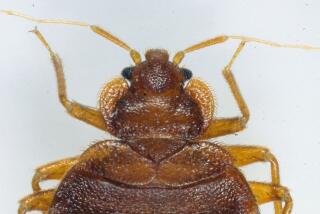Discovering Splendors in the Grass
- Share via
If anything in the cosmos has had worse PR in movies than aliens from outer space, it’s the millions of aliens from our own space, those creeping, crawling, slimy, stinging, biting, buzzing creatures that are so disgusting we actually nickname gangsters after them: bugs!
Of course, bugs aren’t nearly scary enough as they are to satisfy filmmakers. No, they have to mutate them, enlarge them to the size of Mack trucks and give them motivation. Bugs in movies have malice and intent; they scare the hell out of us because they want to.
The truth, as made dazzlingly clear in the brilliant new documentary “Microcosmos,” is that insects just follow nature’s orders, going about it with enviable determination, resourcefulness and inexhaustibility. These are qualities they share with French biologists Claude Nuridsany and Marie Perennou, who spent 15 years preparing for and three years shooting “Microcosmos.”
Their film, with just a couple of opening lines of narration, was one of the sensations at this year’s Cannes Film Festival, where audiences were so spellbound by the behavior of its stars, Miramax gobbled up the theatrical rights and is distributing it as a feature in American theaters.
“Microcosmos” is a nature study on nature’s own terms. Using specially designed camera and sound recording equipment, Nuridsany and Perennou got right down in the grass with their subjects, under water, in the air, giving us up-close and personal looks at more than two dozen species of insects. It’s microphotography and microsound with the quality of the most expensive major studio movies.
When we’re watching a pair of stag beetles lock horns, they sound like bull elks, but the noise is real. When ants lap up water from drops of rain, it’s them we hear, not a herd of wildebeests. And those wing beats of bees aren’t coming from helicopters, no matter what we think.
“Microcosmos” has no story, though it is symmetrically structured as a day on what Nuridsany and Perennou call “the planet below the planet.” We drift through a beautiful cumulus sky in the opening and casually float down into a meadow in the French countryside, descending lower and lower until we are in the midst of these creatures. Face to face, if you want to call those faces.
On one level, “Microcosmos” is the strangest act of voyeurism ever recorded, with bugs caught au naturel, eating, working, metamorphosing. We’re even treated to a steamy scene of unexpurgated snail sex. When this couple gets together, it redefines intimacy and stick-to-itiveness.
On another level, the film is a spectacle and celebration of life, in all its phases. There’s drama in a thunderstorm, violence in territorial combat, fine dining by a spider on crickets du jour and panic set off in an ant community by the appearance of a giant flesh-eating . . . pheasant.
We see this fowl play from the ant’s perspective, looking up through the biologists’ lens at a bird the size of Godzilla. Like a jackhammer, the monster pounds at the earth around us, recoiling with squirming ants trapped in its massive beak. Accompanied by Bruno Coulais’ lushly dramatic score, the scene is as awesomely surreal as anything Hollywood threw at the Incredible Shrinking Man.
You may not acknowledge feelings of sympathy for this living bird feed, but the next time you see it on a restaurant menu, you’re ordering pheasant.
* MPAA rating: G. Times guidelines: Kids won’t even know what those snails are doing.
‘Microcosmos’
A Galatee Films/France 2 Cinema/BAC Films/Delta Images/Les Prods. JMH/Television Suisse Romande/Urania Films production, released by Miramax. Directed by Claude Nuridsany, Marie Perennou. Producers Michel Faure, Philippe Gautier, Andre Lazare, Patrick Lancelot. Camera, Nuridsany, Perennou, Hughes Ryffel, Thierry Machado. Editors, Marie-Josephe Yoyotte, Florence Ricard. Music Bruno Coulais. Sound Phillipe Barbeau, Bernard Leroux.
* Exclusively at the Nuart, 11272 Santa Monica Blvd., West Los Angeles, (310) 478-6379.
More to Read
Only good movies
Get the Indie Focus newsletter, Mark Olsen's weekly guide to the world of cinema.
You may occasionally receive promotional content from the Los Angeles Times.










